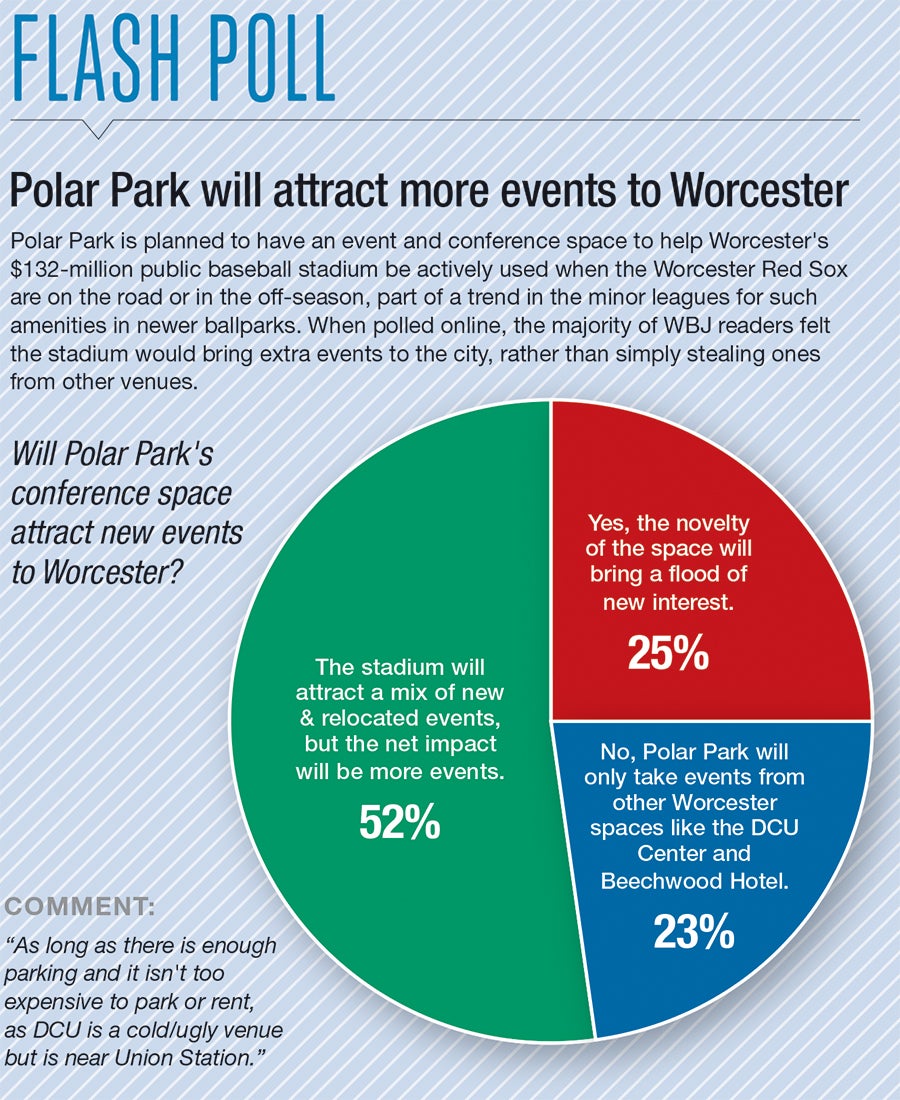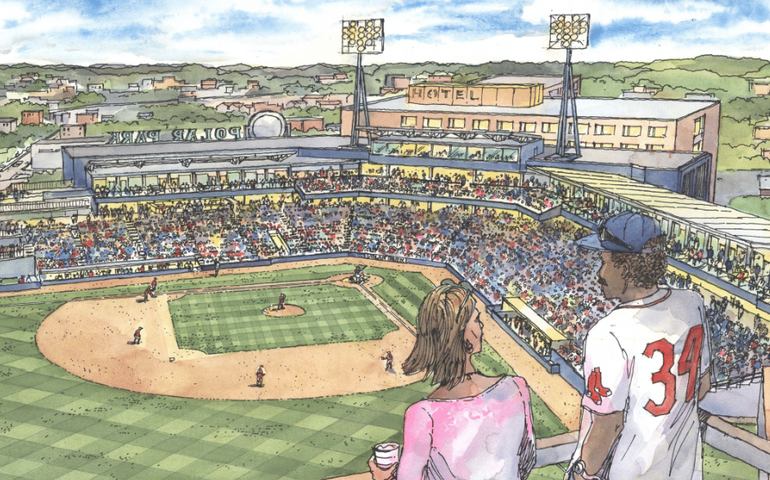Even in the minor leagues, today’s ballparks don’t just serve to host baseball games.
Get Instant Access to This Article
Subscribe to Worcester Business Journal and get immediate access to all of our subscriber-only content and much more.
- Critical Central Massachusetts business news updated daily.
- Immediate access to all subscriber-only content on our website.
- Bi-weekly print or digital editions of our award-winning publication.
- Special bonus issues like the WBJ Book of Lists.
- Exclusive ticket prize draws for our in-person events.
Click here to purchase a paywall bypass link for this article.
Even in the minor leagues, today’s ballparks don’t just serve to host baseball games.
A growing trend is to use the space as often as possible when games aren’t being played – and to play off the novelty of hosting a business function or other event at a baseball stadium.
It’s one component of how Worcester’s $132-million Polar Park baseball stadium is being designed, with a banquet space to be called the DCU Club able to fit up to 400 people at a spot above the park’s infield. A roof deck atop an office building just beyond the left field wall will be able to fit 500 as well, between indoor and outdoor spaces.
Both spots are meant to be used year-round, something to benefit the soon-to-be Worcester Red Sox with an additional revenue stream and the neighborhood by having more events take place there.
It’ll be a stark change from the team’s current home, McCoy Stadium in Pawtucket, R.I., which was built in 1942 and last renovated two decades ago. The only year-round space is the locker rooms, where the team has converted for birthday parties and similar outings.

“All those uses will certainly be multiplied in Worcester,” said Dan Rea III, the WooSox executive vice president for real estate development and business affairs.
The WooSox were already events-minded before settling on a replacement for McCoy. The team created a new dedicated office for events about five years ago and now holds upwards of 75 events a year, Rea said.
“It’s certainly an additional business that we want to run well and run in a productive fashion,” he said.
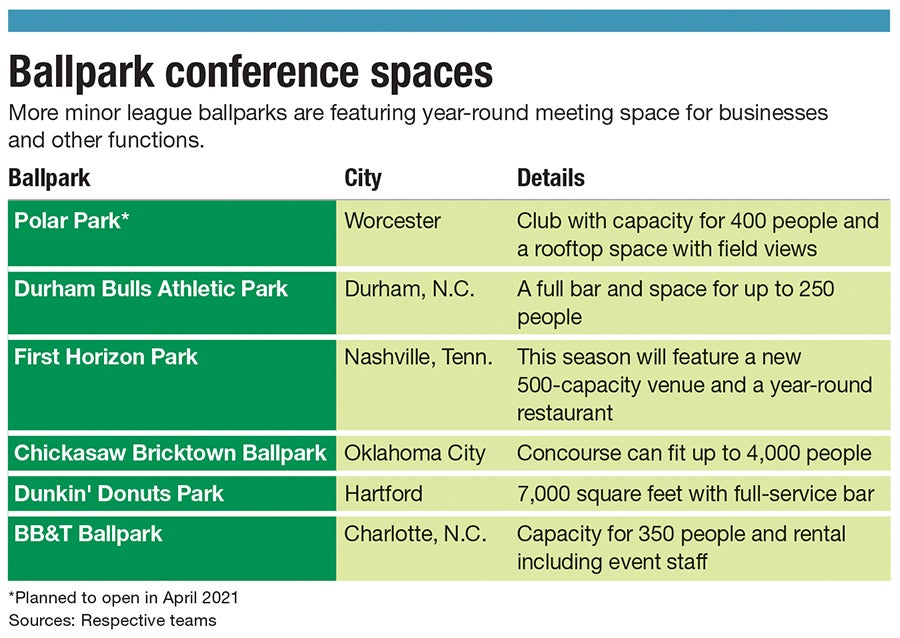
Meeting at the ballpark
For an increasing number of minor league baseball teams, particularly at the higher levels with larger stadiums, hosting events when baseball isn’t being played is a way to bring in additional revenue and better utilize a space that would otherwise sit empty. Such events make ever-costlier stadiums more economically viable, along with concerts, beer festivals and other gatherings.
Banquet rooms can seat hundreds at $16-million Durham Bulls Athletic Park in North Carolina and the $75-million First Horizon Park in Nashville. At the $34-million Chickasaw Bricktown Ballpark, the Oklahoma City Dodgers use an entire concourse for events fitting up to 4,000 people. The Pensacola Blue Wahoos in Florida rent out their locker rooms for baseball-themed events.
“You’ve got such a unique venue,” said Micki Shier, the director of events planning for Huntington Park and the Columbus Clippers, a team in the Ohio capital playing in the same league as the WooSox.
The $70-million Huntington Park has one indoor space available year-round seating a few hundred, attracting both conferences because of the park’s proximity to a convention center and major hotels, as well as the bridal industry. There is outdoor space available any time the team is playing on the road, and the team has even hosted weddings on the field.
“People still come here after 10, 11 years and say, 'I didn’t realize you could do this,'” Shier said.
The $150-million Las Vegas Ballpark, which opened last spring, doesn’t try to compete with major hotels and convention centers in a city among the busiest in the industry. But it hosts meetings, receptions and parties for watching games for the Vegas Golden Knights hockey team and Oakland Raiders football team, who begin playing in Las Vegas this fall.
In Alabama, the Birmingham Barons play in a ballpark designed to be used year-round. The $64-million Regions Field, which opened in 2013, has a ballroom with more than 6,000 square feet and a 4,500-square-foot lounge space. The Barons host about 150 non-baseball events every year, said Jennifer McGee, the team’s senior director of hospitality and events.
In an Atlanta suburb, the $64-million Coolray Field hosts 40 to 50 events each year beyond baseball, including weddings, showers and other events.
“The baseball field is what separates us from hotel ballrooms or convention centers,” said Dave Lezotte, the media relations manager for the Gwinnett Stripers. A ballpark view can impress a client or keep employees engaged, he said.
Even relatively new parks are adapting to the industry shift.
First Horizon Park had only a banquet room for around 100 people when it opened in Nashville in 2015. The ballpark is adding a year-round tent in right field this season to fit around 500 people. That'll be joined by a new full-service restaurant and bar inside the park with views of the baseball diamond, and accessible even when games aren't being played.
“We're optimistic that it's going to do really well. There's a big need for it,” said Adam Nuse, the team's general manager.
Fitting into Worcester
In Worcester, Polar Park is planned to be used on lots of days when the team is on the road or in the off-season.
An agreement between the city and the team said the publicly-owned stadium will host at least 125 events per year, but with a goal of using it every day of the year. That’ll include about 68 Red Sox baseball games starting in April 2021 and concerts, road races, fireworks, collegiate or high school baseball games.
Polar Park will join a Central Massachusetts convention industry branching out beyond the old mainstays, like the Beechwood Hotel or the DCU Center.
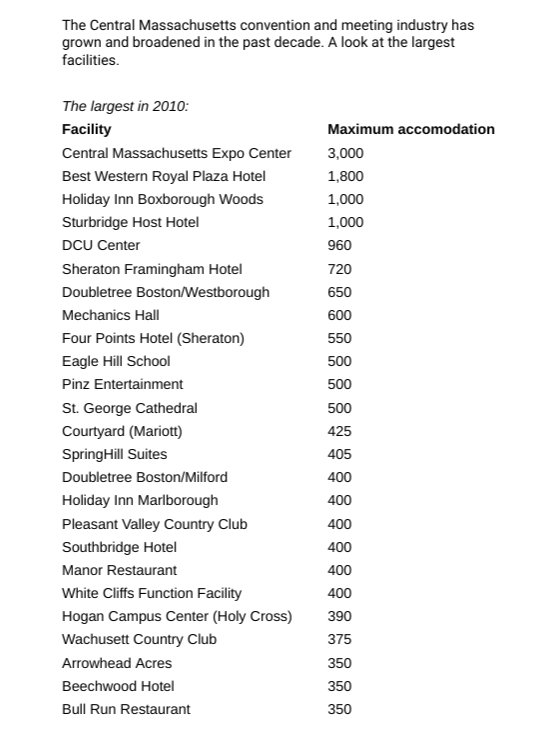
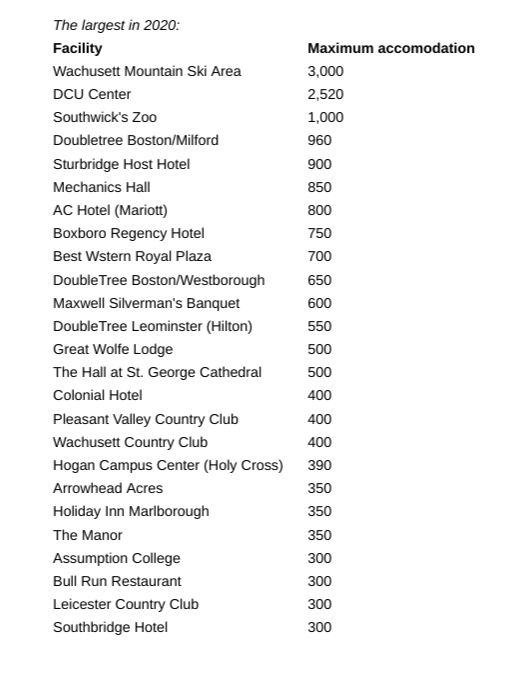
Wachusett Mountain Ski Area in Princeton, for example, can fit gatherings of up to 3,000 with an outdoor tent. Southwick’s Zoo in Mendon can accommodate up to 1,000. Great Wolf Lodge in Fitchburg, known more for its indoor swimming park, can still book gatherings of up to 500, even if it’s not nearly as large a meeting venue as when the site was the Central Massachusetts Expo Center.
Stephanie Ramey, the executive director of the regional tourism office Discover Central Massachusetts, sees Polar Park’s planned events space as giving a “Wow!” factor meeting planners are often looking for.
“Polar Park will provide an opportunity to host an event in an unconventional space and will also afford the opportunity for more experiences,” Ramey said. “Guests will be able to customize activities that complement their event, such as stadium tours, team building activities and photos on the field.”
To Stephani Robson, a professor at Cornell University’s School of Hotel Administration, the ballpark space isn’t as likely to compete with traditional business gatherings better suited to typical hotel banquet rooms, where hotel rooms are under the same roof and light can be better controlled for presentations.
The ballpark will have a better advantage with more social events or for gatherings where the appeal of a baseball stadium makes more sense, Robson said. In part because the ballpark’s events are likely to be somewhat seasonal, she doesn’t foresee Polar Park adding new demand for gatherings that wouldn’t have already been held in or around the city.
“When planning an event, people think of the event first and they look at venue second,” she said. “It’s not the other way around of, ‘Oh, there’s this venue, let’s have an event.’”
